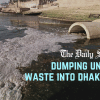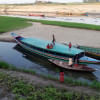Authorities’ inaction put rivers in peril

The deplorable conditions of the rivers around Dhaka city and elsewhere in the country due to encroachment and pollution are the result of inaction of the river custodians and their complicity with the grabbers for decades, National River Conservation Commission Chairman Muzibur Rahman Howlader has said.
Landmark judgments were given by the highest court, repeated outcries were heard from the public and media, directives were given by the prime minister, and laws related to river conservation are all there. But encroachment and destruction of rivers continue.
Following the 2009 High Court verdict, the relevant district administrations arbitrarily set up demarcation pillars around the four Dhaka rivers in the dry season in the name of saving them. But there are shocking allegations that the river custodians had links with the grabbers, said Muzibur, also a former secretary.
“Rivers are a national property that cradles the country’s economy, ecology, culture and heritage and provide plenty of precious sweet water. But they have been victims of greed of the wealthy grabbers, who are politically and socially powerful, and blessed by the government’s executive machinery,” he told The Daily Star in an exclusive interview recently.
Though 99 percent of the country’s people want the rivers to be protected, the government has failed to take action against the remaining one percent -- the grabbers.
Year after year the river commission requested Bangladesh Inland Water Transport Authority (BIWTA), deputy commissioners, Water Development Board (WDB), superintendents of police, and Department of Environment (DoE) to protect rivers. But the conditions of the rivers have become deplorable due to the authorities’ apathy, dilly-dally, inaction and inefficiency in reclaiming rivers.
Most recommendations the commission made over the last one year for eviction of the encroachers have been ignored. The BIWTA has carried out several drives to remove illegal structures from the Buriganga and the Turag in recent months. But they are yet to remove the massive amounts of earth and sand filling the rivers.
“If the authorities do not save the rivers and recover them from grabbers, it is obvious they are complicit in this,” the former secretary noted.
So far, the authorities have not acted in the way they should have. As a result, river grabbing has snowballed into a complicated issue and the authorities’ inaction led to the rivers being in a woeful state today.
Non-implementation of the commission’s recommendations naturally leads to waning public confidence in the commission’s authority, he said.
Shortage of manpower and fund is often a big challenge for officials, but if any official shows negligence in their duty, they must be held accountable, Muzibur said.
He recommended making crimes against rivers a cognisable offence to punish grabbers. To this end, the commission is going to propose forming a special tribunal to try these offenders.
About determining the actual river area, he said the BIWTA, the Water Development Board, the district administrations and the Directorate of Land Records and Surveys have to play their due roles in this regard.
Those who are responsible for demarcating the river boundary and evicting grabbers have not done their job in time, for which they should face action, he said.
“But it will be unfortunate if the authorities do not bring them to book. What we see is the authorities are silent. We have not seen any authority taking action against their officials for their failure to protect rivers,” he said.
The structures within the rivers were not built overnight; they took decades to be built. The authorities that have recently pulled down hundreds of structures, including tall buildings on Buriganga and Turag, in fact allowed grabbers to build those in the first place.
“So, what does it mean? They have not enforced the river laws all these years,” he pointed out.
“Why did the BIWTA and the district administration allow hundreds of buildings and structures to be built on the Buriganga, Turag, Balu, and Shitalakhya? Are not the officials liable?”
He also squarely blamed the shipping ministry, under which the commission operates, for its failure to save rivers.
The River Commission wants to ensure accountability in river conservation efforts, but the shipping ministry is neither willing nor comfortable with it because “the ministry itself is liable” for the failure to protect rivers, he added.
The commission’s inspection reports and recommendations for saving rivers sometimes go against government departments and authorities that are often complicit with the grabbers.
“So, can we expect funds through them for the commission’s work? It is natural that they will not give us money. At times, they demonstrate hostile and non-cooperative attitude towards the commission,” he said.

 For all latest news, follow The Daily Star's Google News channel.
For all latest news, follow The Daily Star's Google News channel. 








Comments